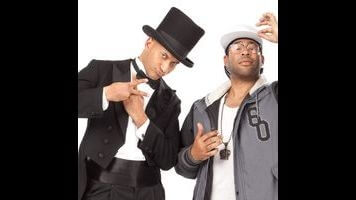For the most part, Keegan Michael Key and Jordan Peele switch responsibilities sketch-by-sketch, so it’s hard to pin down an exact dynamic between the two. But on “Episode Six,” Peele is the weird one at the beginning of each sketch, and Key is the one losing his mind by the end. Because their relationship is so similar, the episode allows both comics to really dig into what could be a very simple emotion. In the case of Key, he’s driven to madness by childish jokes, Peele’s negligence, and occasionally himself. And it doesn’t feel repetitive—he shows off all his brands of crazy.
The episode starts with one of the oddest of opening bits: Key and Peele take the stage, and as Peele tries to have an honest conversation with the audience, Key keeps interrupting him with weird sounds and repeated touching of Peele’s pecs. Key’s making them explode, he says—a little game he likes to play every so often where he pretends to hurt Peele using just his mind. This leads directly into a sketch that takes place in an office. Peele has the dumbest sense of humor imaginable, so he’s still doing that thing where he points to someone’s shirt and says there’s a stain, only to flick his finger upward when they look down. What starts as a juvenile prank turns into an epic battle of deception and heartbreak: Key does everything he can to avoid getting flicked, whether it’s distracting Peele, wearing a neck brace, or spreading mustard all over his shirt so he knows what it looks like down there and doesn’t have to check. Peele responds by sitting on the toilet seat waiting for Key to come in the bathroom and remove his neck brace, or rising from the grave seven years after his death to flick Key’s nose. Things like that.
Like the first episode sketch where Key and Peele literally head to space so their wives don’t hear the word “bitch,” this sketch adds dramatic stakes to a decidedly not dramatic situation. It works wonders on Key & Peele because both actors can, you know, act. There’s a lot of emphasis on writing in the sketch comedy world, so often acting falls by the wayside. But it definitely helps if the people on these shows have an extensive live background before they start writing and acting on TV, like The State for example (a bunch of NYU theater kids). Take this sketch from tonight’s episode, where Key brings fancy Japanese hamburger meat to a barbeque and freaks out when Peele doesn’t treat it with the reverence he thinks it deserves. Key really gives it his all, reacting to the ketchup and the cheese differently. Meanwhile, Peele keeps his cool, but raises an eyebrow every so often and dials up his naïveté every time he makes a request he knows is probably going to piss Key off.
If there’s one thing I’ve begun to notice about Key & Peele, it’s that the arc of a sketch is never telegraphed from the beginning. On a show like, say, The Whitest Kids U Know, it’s pretty obvious what element of the scene is about to get heightened, which deflates some of the surprise. But much like Portlandia, it’s hard to tell when the sketch even begins. Sometimes sketches on Key & Peele establish a world for a while before doing anything weird, like the sketch in tonight’s episode where white people from Undeclared and Party Down come up to them and overcompensate with racial niceties. The humor of that sketch builds so slowly that by the time we get to the final line—outing the bartender as a racist—it’s unclear when the sketch actually “began.” And I love the way the opening bit (a flash mob set to a public domain version of “Thriller” that turns into a race war) is 99 percent set-up, one percent pay-off. Sure, the sketch is only two minutes long, but the ratio still works.
Now that Key & Peele has settled into a groove (and secured a second season), I have a feeling they’ll feel comfortable trying out weird jokes, since I assume they use up a lot of the ideas they’ve been kicking around for a while near the beginning of the show’s run, then have to come up with new stuff under a time crunch. That’s usually the time when shows are made or broken, but “Episode Six” is an indicator that Key and Peele have plenty of freakouts ahead of them, be them UWL-inspired or otherwise.













![HBO teases new Euphoria, Larry David, and much more in 2026 sizzle reel [Updated]](https://img.pastemagazine.com/wp-content/avuploads/2025/12/12100344/MixCollage-12-Dec-2025-09-56-AM-9137.jpg)



























